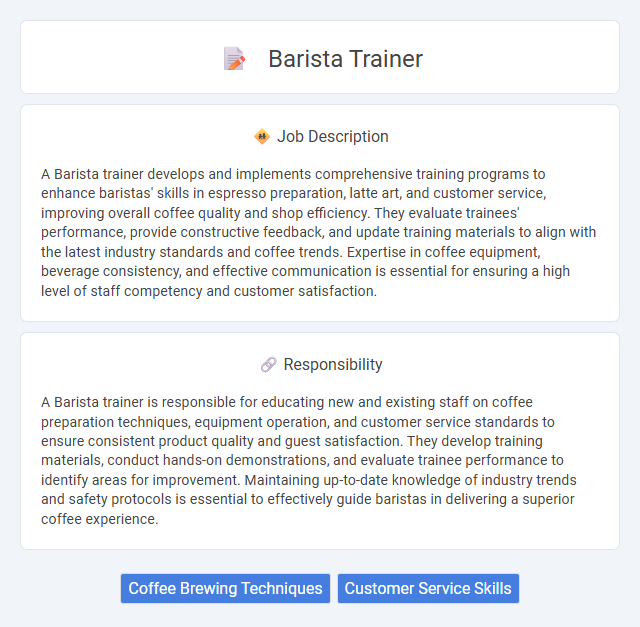
A Barista trainer develops and implements comprehensive training programs to enhance baristas' skills in espresso preparation, latte art, and customer service, improving overall coffee quality and shop efficiency. They evaluate trainees' performance, provide constructive feedback, and update training materials to align with the latest industry standards and coffee trends. Expertise in coffee equipment, beverage consistency, and effective communication is essential for ensuring a high level of staff competency and customer satisfaction.
Individuals with strong communication skills and a passion for coffee culture are likely to thrive as Barista trainers. Those who enjoy teaching and working in fast-paced, customer-focused environments may find this role particularly suitable. Candidates who prefer solitary tasks or lack patience might struggle with the demands of training new baristas effectively.
Qualification
A Barista trainer must possess extensive knowledge of coffee brewing techniques, espresso machine operation, and customer service excellence. Proven experience as a skilled barista with strong leadership abilities is essential to effectively mentor and evaluate trainees. Certifications in coffee preparation, sensory skills, and health and safety standards enhance the trainer's qualification and credibility in the role.
Responsibility
A Barista trainer is responsible for educating new and existing staff on coffee preparation techniques, equipment operation, and customer service standards to ensure consistent product quality and guest satisfaction. They develop training materials, conduct hands-on demonstrations, and evaluate trainee performance to identify areas for improvement. Maintaining up-to-date knowledge of industry trends and safety protocols is essential to effectively guide baristas in delivering a superior coffee experience.
Benefit
Barista trainer jobs may offer the benefit of enhancing professional skills in coffee preparation and customer service, increasing the likelihood of career advancement within the hospitality industry. This role often provides opportunities for leadership development and hands-on experience that can improve technical expertise. Employees might also experience the advantage of working in dynamic environments that foster teamwork and personal growth.
Challenge
Barista trainer roles often involve the challenge of effectively conveying complex coffee-making techniques to trainees with varying skill levels, which can impact the overall quality of cafe service. There is a probability that trainers must adapt their teaching methods quickly to address different learning styles and troubleshoot common brewing errors in real time. Successfully overcoming these challenges may enhance both employee performance and customer satisfaction.
Career Advancement
Barista trainer roles offer significant opportunities for career advancement within the coffee industry, including progression to positions such as cafe manager, quality control specialist, or regional trainer. These roles enhance leadership skills, product knowledge, and staff development expertise crucial for higher management positions. Companies often prioritize internal promotion, allowing successful barista trainers to ascend rapidly in organizational hierarchies.
Key Terms
Coffee Brewing Techniques
Barista trainers specialize in teaching advanced coffee brewing techniques, including pour-over, espresso extraction, and cold brew preparation, ensuring consistent quality and flavor profiles. They emphasize the importance of grind size, water temperature, and brew time to optimize taste and aroma in each cup. Mastery of these techniques improves customer satisfaction and enhances overall cafe performance.
Customer Service Skills
A Barista Trainer must excel in customer service skills to effectively teach baristas how to engage with customers, manage difficult situations, and create a welcoming atmosphere. Strong communication and interpersonal abilities are essential for training staff to deliver consistent, high-quality service that enhances customer satisfaction and loyalty. Mastery in customer service techniques enables the trainer to model best practices and drive positive customer experiences across the team.
 kuljobs.com
kuljobs.com